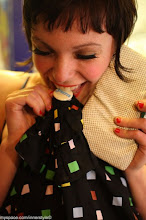If you think the terms ‘retro-art-rock’ and ‘British new-wave’ sound more like snippets of dialogue between two cardigan-clad characters sipping lattes and discussing music in an alternative romantic comedy than a comprehensible explanation of the music produced by Bloc Party, there’s hope for you yet.
Ever since they emerged in the mid-2000s, Bloc Party has been lumped into various different categories that attempt to describe their excellent sound. Keeping in mind music is a difficult thing to describe in the first place, as famous musician Elvis Costello once commented “writing about music is like dancing about architecture”, terms like ‘indie-rock’ and ‘post-punk’ do well to help describe a band like Bloc Party, but they fall short. Aside from that fact that terms like these imply an understanding of the history of music, they also fail to capture how innovative and original these lads are.
The fact that they initially struggled to settle on a name, changing it several times before settling on Bloc Party in 2003, says something more about this group than the fact that they’re a little indecisive. They couldn’t find an appropriate name simply because the music they produce is so fluid and genre-bending-blending it is hard to pin down. In the same way people have attempted to pin-point their sound by comparing them to a multitude of other bands. Although Bloc Party has been compared to bands as diverse as Radiohead, The Strokes, The Cure and Joy Division, they are far from derivative. They create music which is built simultaneously on innovation and appropriation, straddling the border of description and an undefinable experience.
As if they weren’t already evasive enough, Bloc Party’s three studio albums were all given titles that seem oddly inappropriate considering the music they contained. Their debut release, entitled Silent Alarm (2005), is anything but silent. It is a pulsing, sonically progressive and poignant album that demands attention. Their sophomore effort, Weekend In The City (2007), didn’t conjure the sunny sounds or breezy beats of a weekend away. It was a gloomy, politically charged and challenging recording that was far from a holiday. Their latest release entitled Intimacy (2008) explores the bitterness, loss and betrayal associated with breaking-up in a very distant fashion. The use of staccato, thumping beats and happy vocals obscure the fragility and honesty of the often highly personal lyrics. The contradictory names Bloc Party chose to give their albums was a deliberate and self-conscious acknowledgement of the fact that their sound is difficult to describe.
It seems the best way to understand Bloc Party’s music is to forget context, ignore music terminology and go straight to the heart of the experience. Just like the pounding rhythm of a troupe of soldiers marching forth into battle, their footsteps echoing in time with the beat of a drum, the rhythm fill on the opener of Bloc Party’s debut album, ‘Like Eating Glass’, is deliberately set too loud to command attention. The rest of the tracks on the album seethe with a sense of desperation that bleeds throughout the lyrics, the driven, frenzied drum and guitar sections and the fragile, angry vocals. This is how Bloc Party introduced themselves to the world, as a band built on a sense of exhilaration and drama, a group of musicians worthy of attention. Although their next two recordings were sonically very different, they still captivated their signature sound; a sound which is consistently progressive and evades description.
Bloc Party, with their unique blend of genres and their inventive, intelligent approach, produce a sound which is ultimately destined to get lost somewhere between the performance and the listeners ears. But don’t take my word for it, listen to this British four piece and you’ll discover their music speaks for itself.

No comments:
Post a Comment